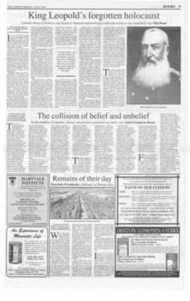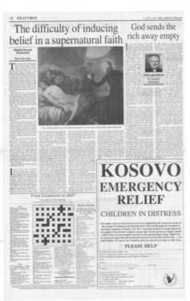Page 9, 21st May 1999
Page 9

Report an error
Noticed an error on this page?If you've noticed an error in this article please click here to report it.
Tags
Share
Related articles
War Without End
The King Congratulates Leopold
King Leopold
King Leopold Is Core Of Belgian Resistance
Fleur Royal Birthday And The Doubts On The Titanic
King Leopold To Be Condemned?
King Leopold's forgotten holocaust
Conrad's Heart of Darkness was based on shameful and terrifying events which history has overlooked, says Phil Hoad
King Leopold's Ghost by Adam Hochschild, Macmillan, £22.50
IT IS NOT YET KNOWN where mass-murderer Slobodan Milosevic ranks in the blackest roll-call of the 20th century. Undoubtedly, he is joining a heinous mob: Pol Pot, Stalin and, of course, a certain moustachioed Austrian.
What is clear when these architects of brutality are laid side by side is the odd discrepancy between the ways in which such monstrously prominent tragedies have been received. Hitler infamously authorised the execution of six million Jews, but for some reason Stalin has escaped his fellow dictator's grisly notoriety, despite the fact that over 20 million died in concentration camps in the Motherland.
Perhaps, in these most incomprehensible of situations, any chance of an accurate report of the truth dies with the first victim. Adam Hochschild's new book King Leopold's Ghost stands testimony to the fact that sometimes genocide is not remembered at all. Between 1885 — when Leopold II's Congo Free State was first recognised — and 1920, it is estimated that the central African region was depopulated by around 10 million people.
At best, the devastating cull is dimly recalled in Europe, yet in the modem Congo the effects of aggressive white intervention are still offensively scrawled on society. Former president Mobutu's brand of US-sponsored capitalism seemed little different from the days when Leopold's mercenary militia, the Force Publique, plundered Congo resources for his coffers. But the Belgian atrocities only represented the extreme of European imperialism; Hochschild's compelling narrative is a forcible reminder to the West of its past failures (and the need to uphold human rights today).
His account trailblazes through the history of the area's colonisation, from the first awe-struck Portuguese who stumbled on the Congo's gaping mouth. It was a further 400 years until a European — Leopold — decisively staked a claim to the river's entire basin. Confined by the tiny Belgian borders, he focused his territorial ambitions on this vast, sweltering tract of Africa opened up by Henry Morton Stanley; the renowned explorer had painstakingly hacked his way through to the west coast, shooting any natives with the audacity to object.
This was about as considerate as treatment of the tribes got. Through his wily diplomatic talent, Leopold had his claim to the territory recognised in 1885 by an international conference that began carving up the continent. Immediately, the king set about ravaging the land.
Initially, the prize of Belgian traders was ivory, but the growing demand for rubber soon took over. Out in the jungle, Leopold's capitalist beast devoured its victims: his agents took a larger cut on goods obtained at lower prices, so they bartered with tribesmen at gunpoint. The King's idea of free trade extended to giving the Force Publique the liberty to conscript blacks for labour purposes.
The justification may have been financial, but the slack leash given to Belgian agents resulted in widespread brutality. Whole villages were slaughtered, scorched-earth style. Fatal flog gings with the chicotte, a whip made from hippopotamus hide, were de rigueur. One gruesome policy sanctioned from the top was that, in order to prove that Belgian bullets had been properly used, the right hands of shot natives should be lopped off and kept as proof. More often than not, workshy troops simply cut them from living men. In a gothic reversal of the white obsession with black cannibalism, the natives fearfully assumed that the colonists' tin cans contained the severed hands. Around 1890, a restless Pole named Konrad Korzeniowski spent six disturbing months on a Congo steamboat. Eight years later he began transforming the experience and later published his work as Heart of Darkness. Hochschild contends fascinatingly that Joseph Conrad's novella is not just the great harbinger of postmodemity that academics admire. It is a grisly, sensitively-observed travelogue: Kurtz, for instance, was possibly based on one Leon Rom, a prominent Force Publique officer who enjoyed collecting butterflies and gamely impaling human heads on his fence.
But Conrad's was not the most decisive voice of dissent. Others saw through Leopold's personal charm and facade of altruism towards his Negro subjects. Amazingly, it was E.D. Morel, a Liverpool shipping clerk, who blew the whistle on the Belgian monarch. Surmising that something was rotten in the state of Congo from the wild profit pouring into Belgium, he mounted a relentless campaign to remove the colony from Leopold's hands.
Morel pilloried governments and obtained highly embarrassing eyewitnesses accounts from insiders in the colony. Beginning in the late 1890s, Morel built a committed organisation and finally forced Leopold to offload the Congo to the Belgian people in 1908.
The Machiavellian king, of course, clung to his prize with all his strength. As Morel slowly dug out and disseminated the truth of events in the Congo, Leopold countered with propaganda. He staged rigged trials of his recalcitrant agents and paid off journalists and lobbyists to produce favourable reports to the public and politicians.
Indeed (alongside Morel's pioneering insistence on the definition of human rights) what stands out is the feral instinct for the manipulation of the truth possessed by the players of the time. Leopold exploited the great distance between the continent to shape his version of events. Likewise, Stanley and others made their reputations thousands of miles from credible witnesses. The Dark Continent, halfshrouded in fiction, provided these men with a carte blanche on which to write themselves. Truth, in Leopold's territory, was the ultimate contraband.
The burgeoning print media provided the King with a new platform from which to wage his information war. Evidently, Adam Hochschild has a equally adept grasp of how to relay his own message: King Leopold's Ghost is a supremely well-told account, fluidly written with robustly painted characters stepping into the drama with almost indecent frequency. Fortunately, he also has a scrupulous regard for the truth, never glossing over awkward details and dauntingly reminding us that human rights remain almost as peripheral as they were a century ago. This humane angle is Hochschild's only bias, and he can surely be forgiven for that.
blog comments powered by Disqus













